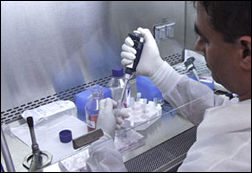Phase
3 Study in Thailand Shows First Evidence that HIV Vaccine Can Reduce Rate of Infection
 | In
a Phase 3 clinical trial with more than 16,000 participants, volunteers who received
a prime-boost combination of the ALVAC HIV and AIDSVAX B/E vaccines were 31% less
likely to become infected with the virus than those who received placebo injections,
according to an announcement from the U.S. Military HIV Research Program. |
|
By
Liz Highleyman  The
trial -- known as RV144 -- was a proof-of-concept study designed to evaluate the
ability of the vaccine combination both to prevent infection and to maintain a
lower viral load in people who did become infected. The
trial -- known as RV144 -- was a proof-of-concept study designed to evaluate the
ability of the vaccine combination both to prevent infection and to maintain a
lower viral load in people who did become infected.
The
study, which took place in Thailand starting in 2003, was conducted by a collaboration
including the U.S. Military HIV Research Program (MHRP), the Thai Ministry of
Public Health, the National Institute of Allergy and Infectious Diseases (part
of the National Institutes of Health), Sanofi Pasteur, and Global Solutions for
Infectious Diseases (GSID).  A
total of 16,402 initially HIV negative men and women aged 18-30 years were randomly
assigned on a 1-to-1 basis to receive either the vaccine combination or placebo
injections. The vaccine group first received a priming vaccine, known as ALVAC
HIV (developed by Sanofi-Pasteur), followed by a booster shot, known as AIDSVAX
B/E (originally developed by VaxGen, now licensed to GSID). Both genetically engineered
vaccines carry genes from HIV strains prevalent in Southeast Asia. A
total of 16,402 initially HIV negative men and women aged 18-30 years were randomly
assigned on a 1-to-1 basis to receive either the vaccine combination or placebo
injections. The vaccine group first received a priming vaccine, known as ALVAC
HIV (developed by Sanofi-Pasteur), followed by a booster shot, known as AIDSVAX
B/E (originally developed by VaxGen, now licensed to GSID). Both genetically engineered
vaccines carry genes from HIV strains prevalent in Southeast Asia.
Vaccine
or placebo injections were administered within a 6-month period. Participants
were then followed for an additional 3 years, receiving HIV prevention counseling
and HIV tests every 6 months. In
the final analysis, 51 vaccine recipients became infected with HIV compared with
74 placebo recipients, a statistically significant difference. While the vaccine
combination was characterized as "modestly effective" -- decreasing
the rate of infection by 31.2% -- even a small reduction could make a considerable
difference on a population-wide basis in areas where HIV prevalence is high. "This
is the first HIV vaccine candidate to successfully reduce the risk of HIV infection
in humans," said U.S. Army Surgeon General Lt. General Eric Schoomaker in
a MHRP press release. "We are very excited and pleased with the outcome of
this trial and congratulate all those who participated in it." These
results are a welcome surprise, since HIV vaccine research to date has proven
disappointing. In 2003, investigators reported that AIDSVAX (based on the HIV
gp120 envelope protein) did not prevent infection when used alone. In
another previous trial, HIV positive participants who received ALVAC HIV (HIV
genes carried by a disabled canarypox vector) as a therapeutic vaccine not only
failed to achieve a lower viral load, but had to resume antiretroviral therapy
sooner due to disease progression. Most recently, in
the STEP trial, Merck's V520 vaccine (HIV genes with an adenovirus vector)
neither prevented infection nor lowered viral load among those infected. But
the results of the RV144 trial may rekindle some optimism in the field. "These
results show that development of a safe and effective preventive HIV vaccine is
possible," said MHRP Director Colonel Nelson Michael. "While these results
are very encouraging, we recognize that further study is required to build upon
these findings." "The
outcome is very exciting news and a significant scientific achievement,"
International AIDS Vaccine Initiative (IAVI) president Seth Berkley said in a
statement
posted on the organization's web site, "It's the first demonstration
that a candidate AIDS vaccine provides benefit in humans. Until now, we've had
evidence of feasibility for an AIDS vaccine in animal models. Now, we've got a
vaccine candidate that appears to show a protective effect in humans, albeit partially."
Detailed
results from the study will be presented at the AIDS Vaccine Conference, to be
held October 19-22 in Paris.
9/25/09 Source U.S.
Military HIV Research Program. HIV Vaccine Study First to Show Some Effectiveness
in Preventing HIV. Press release. September 24, 2009. International
AIDS Vaccine Initiative. IAVI Statement on Results of Phase III ALVAC-AIDSVAX
Trial in Thailand. Press release. September 24, 2009. |